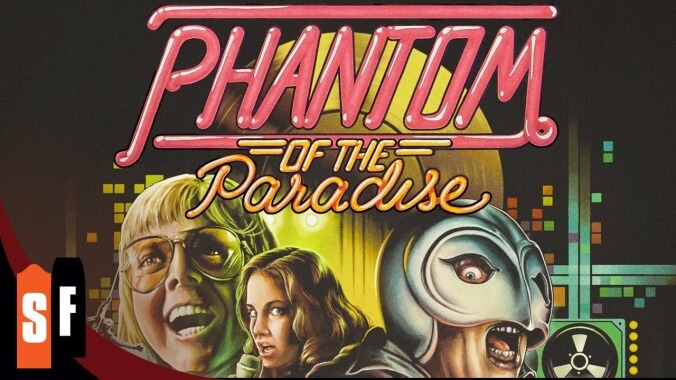There’s over-the-top, and then there’s Brian De Palma’s Phantom Of The Paradise
Film Features Watch This
Watch This offers movie recommendations inspired by new releases or premieres, or occasionally our own inscrutable whims. This week: The recent (and very strange) Jeannette: The Childhood Of Joan Of Arc has us tapping our toes to other rock musicals, rock operas, and rock-driven movies.
Phantom Of The Paradise (1974)
Phantom Of The Paradise, the rock musical about a rock musical (technically, rock cantata), represented the pinnacle of Brian De Palma’s undisciplined early excess: a smorgasbord of camp, Grand Guignol, and bird imagery that thumbed its metal beak at commercial considerations just a few years before the director’s unexpected transformation into a successful Hollywood filmmaker. William Finley, a college friend of De Palma’s, stars as Winslow Leach, an Erik-Satie-loving geek who has his Faust-inspired song cycle stolen by the demonic, Phil-Spector-esque pop producer Swan (Paul Williams, who also wrote Phantom’s Oscar-nominated music), the head of the world-famous Death Records, and takes to hiding in the rafters of Swan’s new concert venue in a cape and owl mask after escaping from Sing Sing and being disfigured in a record press.
As they say, it’s complicated. The terrifically convoluted plot (narrated by an uncredited Rod Serling) is wall-to-wall exposition, borrowing story points from The Phantom Of The Opera, Faust, The Picture Of Dorian Gray, and The Abominable Dr. Phibes, among many others; the grab-bag quality of Phantom’s pastiche is exemplified by a split-screen homage to the opening shot of Touch Of Evil that doubles as a musical send-up of The Beach Boys. The production design—by Jack Fisk, better known for his work with Terrence Malick, Paul Thomas Anderson, and David Lynch—is low-budget rock ’n’ roll gothic, from the claustrophobically futuristic Death Records offices (a great detail: the doors are all Williams’ height) to the Phantom’s lair of Moog synths. The characters are, of course, all cartoons: the Phantom; Swan; the love interest, Phoenix (Jessica Harper); the diva-ish glam-rock doofus Beef (Gerrit Graham).
Phantom Of The Paradise was always destined to become a box-office flop (though it was bizarrely successful in the Canadian city of Winnipeg), and its underdog audacity suggests either the world’s most decadent student film or the last movie De Palma ever thought he would get to make. Few would argue that the films that would follow—Carrie, Blow Out, and Scarface among them—represented a betrayal of the director’s early movie-hedonism, though it can still come as a shock to see familiar De Palma staples as video-surveillance paranoia and Hitchcock references in such deranged form. (De Palma’s chutzpah developed way before his technical mastery; the editing here is often abrupt and awkward.) Like so much of his work, it only appears to be a superficial exercise. Buried in the crazy secondhand plot twists is a more nuanced allegory of the Faustian bargains of art and commerce: the Mephistopheles figures of the industry are actually Fausts themselves, temptation is a pyramid marketing scheme, and everyone eventually becomes a metal-masked Phantom.
Availability: Phantom Of The Paradise can be rented or purchased through the major digital services. It can also be obtained on DVD or Blu-ray from Netflix, Amazon, or possibly your local video store/library.